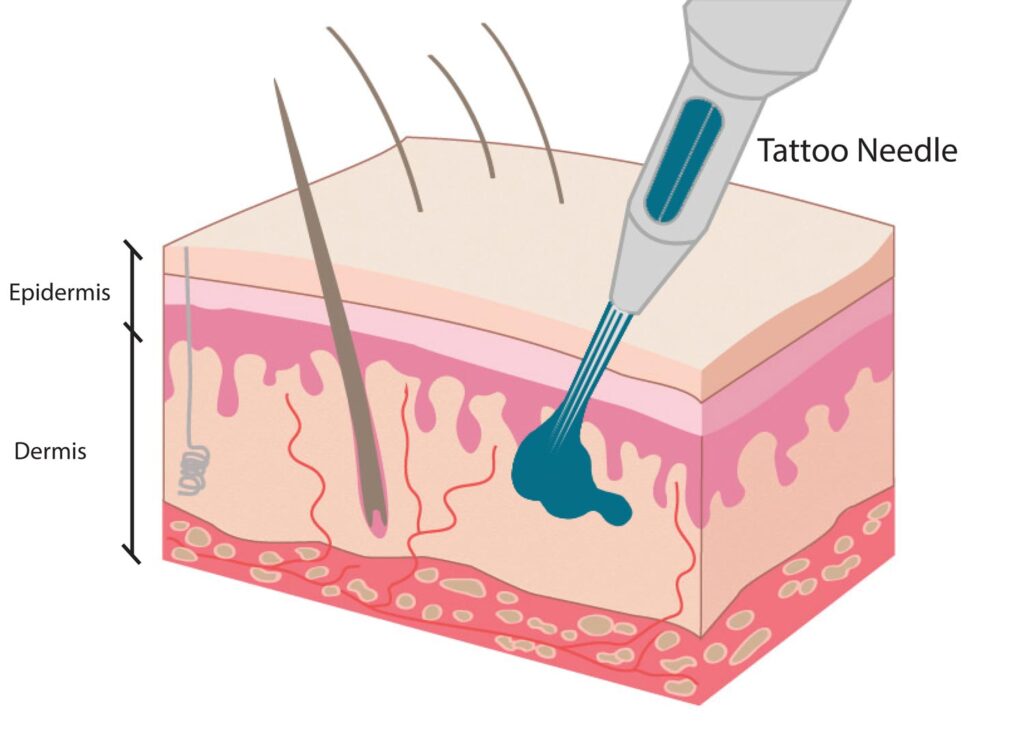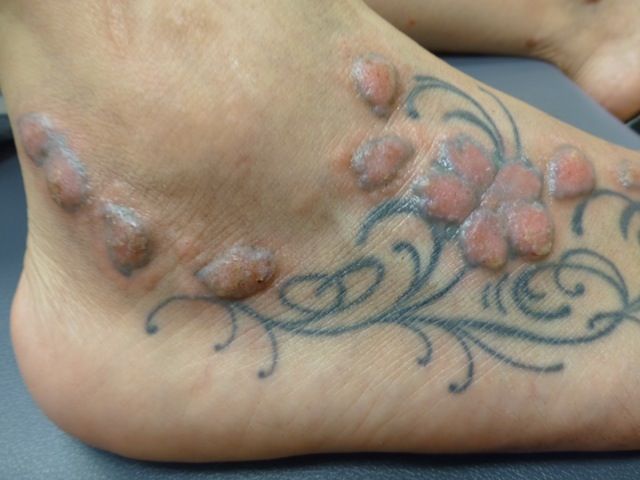5 Rare, but Severe Risks of Permanent Tattoos
Today tattoos have seen an explosion in popularity! They empower self-expression and simply look cool! So it’s no surprise that nearly half (47%) of millennial's in Britain say they have at least one tattoo! We believe your body is your canvas, but it’s wise to think before you ink. Most permanent tattoo inks have identical ingredients to commercial printers and car paint - so you can expect a few risks to come along with it!
(47%) of millennials in Britain say they have at least one tattoo!
How it Works
A permanent tattoo requires breaking the skin through needles and inserting pigments into the dermis which is a deep layer of the skin. In modern days’ tattoo artists use machines that work like hand-help sewing machines, with needles continuously going up and down depositing ink into the skin.
This process can cause bleeding and potentiality a lot of pain. Like anything in the world, getting inked has it’s pros and cons, and it’s always advisable to make an informed decision. Lets go through some of the major health risks.

1: Tattoo Infections are more Common than you'd Expect!
Even if the tattoo parlor looks hygienic and the artist uses sealed equipment, the fact of the matter is most tattoo inks are unregulated! FDA only oversees pigments that are used externally and permanent tattoo ink is not regulated by the FDA at all as it’s for internal use. Not only that but the ingredients of the tattoo ink are kept from the consumers as FDA ingredient labeling requirements don’t apply to products sold wholesale to shops. Due to this there have been a few cases of infections due to non sterile ink. In 2012 FDA linked a wide spread bacterial outbreak to contaminated ink, but unfortunately FDA and other public safety organisations only step in when something really bad happen! A study done in 2011 in Denmark found 10% of unopened tattoo ink bottles were tainted with bacteria. Hopefully there will be better regulation of tattoo ink but until than.. take extra care!
2: Tattoo Allergies are Real!
YES! Allergic reactions are very real and very gruesome!
NOTE: Allergic reactions don’t always develop immediately; sometimes they can occur after weeks or even year! Typically red dye is the culprit, but really any colour can cause a reaction! It’s always best to get a test patch before jumping to get a big design as allergic reactions can scar you for life – and not just emotionally!
Symptoms of a tattoo allergic reaction can include: rash, swelling, itching, raised scaly patches, deep lumps, blisters

A surprising number of people suffer from long-term problems with tattoos. This patient suffered for more than a year with tattoo-related complications! (Image: © Courtesy of NYU Langone )
3: Cancer Risk with Tattoos?
Ok, despite the scaremongering out there, there is actually not enough research out there to establish a direct link between tattoos and cancer!
However..
If you’ve got a family history of skin cancer than it’s better to be safe than sorry and avoid getting inked! There is enough information out here about the possible connection and you simply don’t want to risk it!
Dr. Cormac Joyce at University Hospital Galway says needling metallic salts and organic dyes into the skin can cause inflammation that can lead to “malignant transformation.” She believes tattoos can put those already at risk in danger. Talk to your GP if you’re concerned!
4: Tattoos cause MRI Complications
So this is a rare one, but MRI machines can cause the pigment in tattoo ink to heat up and burn the skin. This is generally Black tattoo ink, as it commonly contains iron oxide, and the MRI scanner can cause the iron in the ink to heat up.
Also, tattoos can interfere with the MRI imaging!
5: Tattoo Ink adds Strain to the Lymphatic System
Tattoo ink may strain your lymph nodes and in turn affect the immune system and skin inflammation. It’s been found that pigments can migrate from the skin through to the lymphatic system, bloodstream and liver. Researchers examined the lymph nodes of tattooed donors and found elevated levels of metals such as aluminium, chromium, titanium, iron, nickel, copper and even cadmium and mercury – both which are highly toxic!
However, despite the research there is still not enough evidence to prove other factors could be at play.
Conclusion
Although most people don’t have adverse reactions to tattoos, it’s important to follow best practice rules to avoid any nasty surprises later on. Consider if the tattoo artist is reputable, if they wear gloves and use needles from sealed packaging, also remember to take good aftercare of your tattoo and keep it clean.
There are numerous advantages to getting tattoos, they can boost self-confidence, make you feel sexy, rebellious and intelligent – but why get a permanent tattoo when a semi-permanent tattoo can do the same? This way you don’t have to go through the pain and stress of getting a permanent tattoo or worry about regretting it later!































